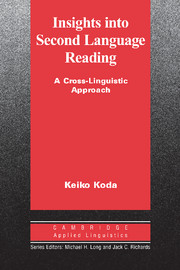10 - Developing strategic reading
Published online by Cambridge University Press: 05 October 2012
Summary
Accomplished readers continuously adjust their reading behaviors to accommodate text difficulty, task demands, and other contextual variables. Monitoring their reading process carefully, they take immediate steps when encountering comprehension problems. Aware of their own cognitive and linguistic resources, they are capable of directing their attention to the appropriate clues in anticipating, organizing, and retaining text information. These and similar behaviors, separating accomplished and less-accomplished readers, essentially characterize what is referred to as strategic reading. It is generally acknowledged that beyond information-processing skills, reading proficiency requires capabilities for exploiting cognitive and other resources to their maximum benefit. For these reasons, readers' real-time thoughts and actions – what they do and why – have attracted serious attention in both L1 and L2 reading research. Three issues are central: what behaviors are consciously initiated by readers to improve their ongoing comprehension, how such reader-initiated behaviors can be examined systematically with different groups of readers under varying conditions, and which reader-initiated actions are most efficacious in enhancing comprehension.
Several circumstances contribute to the popularity of this research. First, the significance of strategic reading has become widely recognized only relatively recently. Researchers now generally concur that strategic reading is vital in academic pursuits, where reading often is inseparable from learning, necessitating both understanding and retaining complex, often unfamiliar concepts. Second, recent advancements in research methodology now afford stable data on reader introspection, creating a window through which readers' own accounts of how a task is performed – and the ways they manage a wide range of cognitive activities – can be deciphered and analyzed.
- Type
- Chapter
- Information
- Insights into Second Language ReadingA Cross-Linguistic Approach, pp. 204 - 224Publisher: Cambridge University PressPrint publication year: 2005



